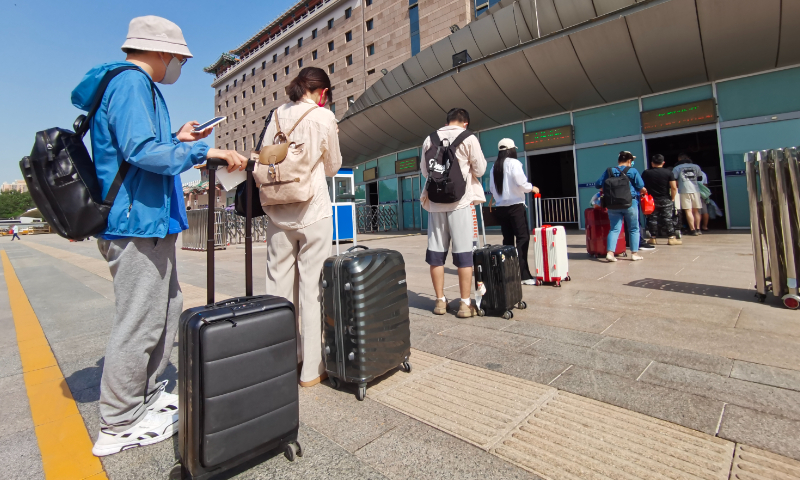
Passengers line at the Beijing West Railway Station on May 28, 2022. Photo: VCG
Chinese authorities have stepped up efforts to stem the spread of COVID-19 during the three-day Dragon Boat Festival holidays, when a tourism boom is expected after localities eased anti-epidemic restrictions on inter-provincial and other travel activities as the epidemic situation in the country improves.
While the holiday travel peak could increase the risk of transmission, large-scale outbreaks are unlikely given the prevention measures in place and the country's experience in containing the virus spread, health experts said.
The Ministry of Culture and Tourism issued a notice ahead of the holidays, saying that travelers should monitor the epidemic situation in their destinations and avoid visiting high-risk and medium-risk regions.
In an effort to stem the spread of the virus, the ministry said that inter-provincial group tours would be immediately suspended, if regions were designated as medium-risk or high-risk areas for COVID-19. The ministry also urged travel agencies to carefully implement anti-epidemic requirements.
At a press conference in Beijing on Wednesday, local health officials said that dine-in services will remain suspended in the capital city during the holidays, while shopping malls and scenic spots in none-epidemic regions can resume business under strict anti-epidemic measures.
The relaxation of restrictions in most places of the city came after Beijing announced on Saturday that the latest round of epidemic flare-up has been successfully curbed, 37 days after the first infection of this round was reported.
Residents in Beijing and several other cities are urged stay put and reduce their travel activities during the holidays, while health monitoring of people entering and leaving the city will be strengthened.
Central China's Henan Province will issue yellow health QR code to people when they first enter the province, which triggers strict anti-epidemic measures. Their yellow health code will be lifted, once they receive two tests within three days.
The risk for COVID-19 transmission and spread among cities and different categories of populations would largely increase because of the expected tourism boom during the holidays naturally, which brings more mobility and frequent people-to-people communications, a health expert based in Beijing told the Global Times on Wednesday.
A report sent by online travel agency Lvmama to the Global Times on Wednesday showed that inter-provincial travel will be the most popular choice of travelers during the holidays. With the improving epidemic situation nationwide, the enquiries and reservations for trips to the countryside or seaside have sharply increased.
However, the expert said, drawing previous experiences in curbing COVID-19 resurgence during the holidays, possibilities of having major outbreaks during the Dragon Boat Festival is low and the overall epidemic situation in the country has improved. Warmer temperature also tends to slow down the transmission of respiratory viruses, including COVID-19.
Travelers are still recommended to take protective measures to increase vigilance against any outbreaks.
China on Tuesday registered 22 locally-transmitted confirmed COVID-19 cases scattered in four regions, a drastic drop from a peak of some 20,000 cases daily in April.
As a way to detect potential COVID-19 cases in a quick manner, major cities with millions of populations still require residents to take nucleic acid testing regularly - either, every 48 hours, 72 hours or every week, which can be adjusted in accordance with the local epidemic situation, according to the National Health Commission.
There are 17 cities with a population of more than ten millions across the country.
Smaller cities are also making similar arrangements. For example, Cangzhou in North China's Hebei Province requires residents to take test every week, with male residents being tested on Mondays and females on Thursdays.




